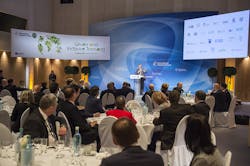Transport Sector Unites to Launch Global Decarbonising Transport Project
The International Transport Forum (ITF) at the OECD has officially launched a major global initiative towards carbon-free transport. Transport activity currently contributes 23% of global CO2 emissions from fossil fuels, with the share expected to rise.
“The COP 21 Paris Agreement created a political pathway for global CO2 mitigation efforts. The key is to close the gaps between commitments and delivery. It is now up to the transport sector to demonstrate how carbon-free mobility can be achieved. That is why we are launching today the Decarbonizing Transport project”, said Secretary-General José Viegas at the project inauguration event during the Annual Summit of transport ministers in Leipzig, Germany.
“This is a very ambitious project. But ambition is what the world needs to stop climate change. Ambition is also something that has characterized the transport sector throughout its long history of innovation. Our challenge is to reduce transport CO2 without sacrificing the access and opportunities offered by transport, keeping our societies together and making our economies turn,“ said Viegas.
The Decarbonizing Transport project aims to:
- Provide a common assessment tool based on a comprehensive modelling framework supported by dialogue with key stakeholders. This is essential for “clarity, transparency and understanding” of Intended Nationally Determined Contributions as required in the Paris Agreement for carbon emissions. This approach will enable the ITF and its partners to evaluate the impacts of different sets of measures on carbon reduction.
- Enable countries and other stakeholders to translate roadmaps into actions that deliver results grounded in quantitative data.
- Support actions to achieve the UN Sustainable Development Goals along with the decarbonization of the transport sector.
The Decarbonizing Transport project is supported by a wide range of stakeholders, including private sector companies, multilateral development banks, intergovernmental organisations, sector associations, NGOs and research institutions. It is anchored in the ITF’s Corporate Partnership Board, the organisation’s platform for discussions with the private sector.
“The inclusive nature of this project is a central feature and key factor for success of this project,” said Viegas. “It makes me proud that in only four months more than 40 partners and supporting organisations are committing to bringing knowledge, data, networks and financial contributions to the Decarbonizing Transport project.
I welcome other organisations, companies and institutions to join.”
Christiana Figueres, executive secretary of the United Nations Framework Convention on Climate Change (UNFCCC) applauded the Decarbonizing Transport initiative. “Governments must have the tools to understand whether or not policy is working as intended, and robust, responsive tools give policymakers a better sense of what can be accomplished. I welcome the launch of the Decarbonizing Transport project. This common assessment tool […] should unite the transport sector worldwide in the push towards climate neutrality.”
European Commissioner Maroš Šefčovič, vice president of the Energy Union, also hailed the ITF initiative.“Our generation will be remembered as the one who made the giant leap in clean transport. The European Commission is driving the transition to a low-carbon mobility system, and I warmly welcome the support of the International Transport Forum in this undertaking. The transition to clean energy and mobility is in full swing, we should move fast. On the road to decarbonization of transport there is no speed limit.
The preliminary results of the project will be presented at the next ITF Summit in May 2017. The work will be completed by 2018/19, in time for the first round of reviews of the COP21 decarbonization targets in 2020.
